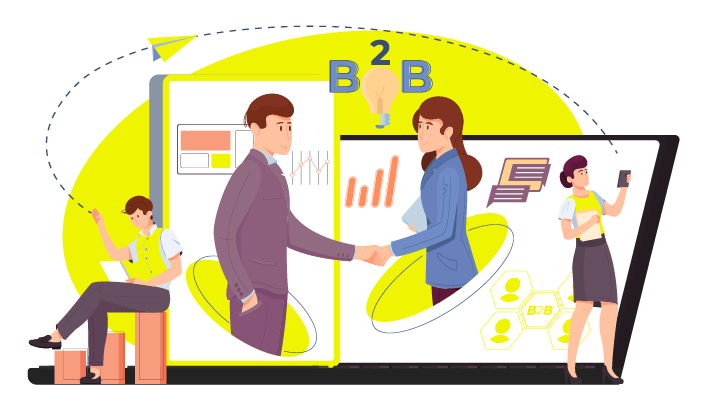Maximizing B2B Impact with Influencer Marketing
In today’s digital age, influencer marketing has become an effective tool for businesses to reach and engage with their target audience. While traditionally associated with B2C marketing, influencer marketing can also be an effective strategy for B2B businesses. In fact, according to a study by Forbes, 82% of B2B decision-makers said that they were more likely to trust a company whose CEO is active on social media.
In this article, we’ll explore the benefits of influencer marketing for B2B businesses and how to effectively implement it into your marketing strategy.
What is Influencer Marketing?
At a fundamental level, Influencer marketing involves partnering with individuals who have a significant following on social media to promote your brand, product, or service. These individuals, also known as influencers, have the power to affect the purchasing decisions of their followers, making them effective marketing tools.
Influencers can be divided into three categories: micro, macro, and mega. Micro-influencers have a smaller following, typically between 1,000 to 10,000 followers, while macro-influencers have a larger following, ranging from 10,000 to 1 million. Mega-influencers, on the other hand, have a following of over 1 million followers.


Utilizing Influencer Marketing for B2B
Partner with influencers to build B2B credibility. Leverage their trust and reputation to establish your own authority in your industry.
Benefits of Influencer Marketing for B2B
Increase Brand Awareness
It can help B2B businesses increase brand awareness among their target audience. By partnering with influencers who have a relevant following, businesses can reach a wider audience and increase brand visibility.
For example, if you are a B2B company that sells marketing software, partnering with an influencer who has a following in the marketing industry can help increase brand awareness among potential customers.
Build Trust and Credibility
Firstly, influencers have built a relationship of trust and credibility with their followers. To be a partner with an influencer, B2B businesses can leverage this trust to build their own credibility and establish themselves as an authority in their industry.
For example, for a B2B company that provides accounting services, partnering with an influencer who is an expert in finance can help build your credibility and establish your brand as a trusted authority in the industry.
Increase Engagement and Lead Generation
Therefore, it can also help B2B businesses increase engagement and lead generation. An influencer who has a relevant following, businesses can encourage their followers to engage with their brand and generate leads.
For example, let’s say you are a B2B company that sells software for project management, partnering with an influencer who has a following in the project management industry can help generate leads and increase engagement among potential customers.
Innovative marketing solutions in Sales Matic

At Sales Matic, we provide a range of innovative marketing and sales solutions to help businesses achieve their goals. Our approach is based on personalization, automation, integration, and analytics, allowing us to create tailored strategies that drive engagement, conversions, and customer retention.
In addition to our core services, we also offer outsourced cold-calling sales services. Our team of experienced sales professionals can help you generate leads, set appointments, and close deals, all while representing your brand with professionalism and expertise. Whether you need to jumpstart your sales pipeline or supplement your existing sales team, we have the tools and expertise to help you succeed.
In our company, we’re committed to delivering high-quality results and exceptional customer service.
How to Implement Influencer Marketing for B2B
Identify Relevant Influencers
The first step in implementing influencer marketing for B2B is to identify relevant influencers who have a following in your industry. Look for influencers who are active on social media platforms like LinkedIn and Twitter, and who have a significant following among your target audience.
Establish Relationships with Influencers
Once you have identified relevant influencers, the next step is to establish a relationship with them. Reach out to influencers with a personalized message, expressing your interest in partnering with them and how you can help them and their followers.
Building relationships with influencers takes time and effort. Be patient, and don’t expect immediate results. The key is to establish a genuine relationship based on mutual respect and trust.
Create Content with Influencers
After establishing a relationship with influencers, the next step is to create content with them. This can be in the form of blog posts, social media posts, or even webinars.
Create a Content Strategy
Before creating content with influencers, it’s important to develop a content strategy that aligns with your marketing goals. This includes defining your target audience, the key message you want to convey, and the specific content formats that will be used.
For B2B businesses, the content should be informative, educational, and focused on providing value to the target audience. This could be in the form of whitepapers, case studies, or research reports.
Measure Results
Measuring the success of your influencer marketing campaign is crucial to determine its effectiveness and ROI. The metrics to measure can include engagement rates, click-through rates, lead generation, and conversion rates.
To effectively measure the success of your campaign, set specific goals and use tracking tools to monitor the progress. This will help you make informed decisions on how to optimize your strategy and improve results.
Stay Compliant with Regulations
Regulations and guidelines, such as those issued by the Federal Trade Commission (FTC), apply to influencer marketing. These guidelines require influencers to disclose their partnerships and affiliations with brands, to ensure transparency and prevent deceptive advertising practices.
B2B businesses must also comply with these regulations to avoid legal issues and maintain credibility with their audience. Be sure to educate yourself and your influencers on these guidelines to avoid any potential issues.
Utilizing LinkedIn Advertising: Sponsored Content, Sponsored InMail, and Display Ads
LinkedIn offers several advertising options for businesses looking to increase their brand’s visibility on the platform. Sponsored content allows businesses to target their content to specific demographics based on location, job title, and interests. Sponsored InMail enables businesses to send personalized messages to targeted LinkedIn users, while display ads are banner ads that appear on LinkedIn pages.
To make the most of these advertising options, businesses should create engaging content that is tailored to their target audience and aligns with their overall marketing strategy. It’s also important to regularly monitor ad performance and adjust targeting and messaging as needed to optimize results.

Examples of Successful B2B Influencer Marketing Campaigns
Adobe’s CMO.com
Adobe’s CMO.com is a leading digital marketing platform that offers insights and resources for marketing professionals. Adobe partnered with leading marketing influencers to create content and promote the platform, increasing engagement and lead generation.
IBM’s Think Marketing
IBM’s Think Marketing is a leading digital marketing platform that provides insights and resources for marketers. IBM partnered with leading influencers in the marketing industry to create content and promote the platform, increasing engagement and brand awareness.
Dell Technologies’ Luminaries
Dell Technologies’ Luminaries is a podcast series that features industry leaders and influencers discussing technology and innovation. Dell partnered with leading influencers in the tech industry to create content and promote the podcast, increasing engagement and thought leadership.
Influencer marketing is a valuable tool for B2B companies to increase brand awareness, build trust, and generate leads!
Finally, influencer marketing can be a powerful tool for B2B businesses to increase brand awareness, build trust and credibility, and generate leads. By identifying relevant influencers, building relationships, creating a content strategy, measuring results, and staying compliant with regulations, B2B businesses can effectively implement influencer marketing into their marketing strategy.
Successful B2B influencer marketing campaigns, such as Adobe’s CMO.com, IBM’s Think Marketing, and Dell Technologies’ Luminaries, demonstrate the effectiveness of this strategy when executed properly.
Remember,is not a one-time campaign but a long-term strategy that requires patience, effort, and a commitment to building relationships with influencers and delivering value to your target audience.



